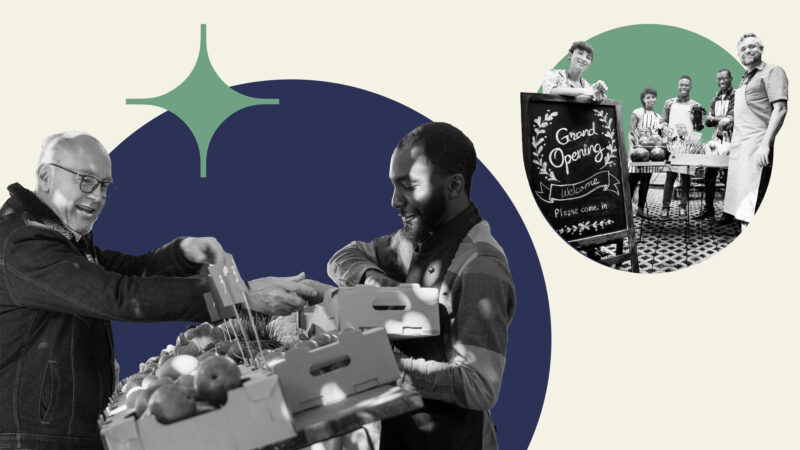Press Release
Chicago Mayor Announces The Exploration Of A Municipally Owned Grocery Store
09. 13. 2023
"The City of Chicago is reimagining the role government can play in our lives"

CHICAGO — Today, Mayor Brandon Johnson announced a partnership with the Economic Security Project to start on a pathway towards the opening of a municipally owned grocery store in Chicago. The Economic Security Project, a national non-profit dedicated to building economic power for all Americans, will provide technical assistance in determining a pathway to the first municipally owned grocery store in Chicago. This collaboration furthers the Johnson administration’s work towards repairing past harms that have contributed to purposeful disinvestment and exclusion and lack of food access in historically underserved communities.
“All Chicagoans deserve to live near convenient, affordable, healthy grocery options. We know access to grocery stores is already a challenge for many residents, especially on the South and West sides,” said Mayor Brandon Johnson. “A better, stronger, safer future is one where our youth and our communities have access to the tools and resources they need to thrive. My administration is committed to advancing innovative, whole-of-government approaches to address these inequities. I am proud to work alongside partners to take this step in envisioning what a municipally owned grocery store in Chicago could look like.”
Historic disinvestment has led to inequitable access to food retail across Chicago, and these existing inequities have been exacerbated as at least six grocery stores closed on the South and West sides over the past two years. According to estimates from the U.S. Department of Agriculture, 63.5% of residents in West Englewood and 52% of residents in East Garfield Park live more than half a mile from their nearest grocery store, whereas in West Town less than 1% of residents experience this barrier to food access. Moreover, food access and security link directly to environmental and racial justice. 37% of Black residents and 29% of Latine/x residents are food insecure, compared to 19% of residents overall. Exploring innovative initiatives to support food retail is part of the Johnson administration’s broader commitment to correcting systems and practices that have created these inequities.
“The City of Chicago is reimagining the role government can play in our lives by exploring a public option for grocery stores via a municipally owned grocery store and market,” said Ameya Pawar, Senior Advisor at Economic Security Project. “Not dissimilar from the way a library or the postal service operates, a public option offers economic choice and power to communities. A City-owned grocery store in the South or West side of Chicago would be a viable way to restore access to healthy food in areas that have suffered from historic and systemic disinvestment.”
The impact of inadequate food retail reaches beyond food access. Grocery stores serve as anchors in communities by employing community members and acting as a catalytic business for nearby commercial activity. Grocery store closures, especially in areas that rely on one grocery store provider, force residents to leave their neighborhoods and spend money outside of their communities to find healthy, affordable, enjoyable food options. This contributes to the existing “retail gap” many South and West side communities face, where millions of dollars in local residents’ purchasing power that could have been invested in their community ends up supporting retail stores in other parts of the city. This feasibility study will contribute to the administration’s commitment to investing in innovative solutions to address community infrastructure, neighborhood revitalization, and economic vitality.
“The strides being made in the realm of food justice are now poised for a significant advancement towards innovative solutions,” said Anton Seals Jr., Lead Steward of Grow Greater Englewood, Mayoral transition subcommittee co-chair, and inaugural member of the City’s Food Equity Council. “This opportunity marks a pivotal moment to forge pathways for food accessibility, with the City recognizing its role as a key partner in addressing market shortcomings. By doing so, it aims to propel solutions in communities that have long faced challenges in accessing nutritious and affordable food options. This partnership aligns with broader statewide initiatives, representing a truly distinctive moment in time. These efforts hold the promise of creating a profoundly meaningful impact.”
The findings of the feasibility study will help inform the Johnson administration’s emerging food retail strategy, which will receive input from experts, community leaders, and Chicago’s Food Equity Council. The City looks forward to pursuing values aligned funding opportunities, particularly those made possible by the Illinois Grocery Initiative, which commits $20M for grants and technical assistance for grocery stores across the state. If advanced, Chicago would be the first major city in the United States to implement a municipally owned grocery store to address food inequity.